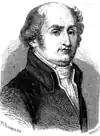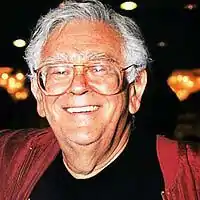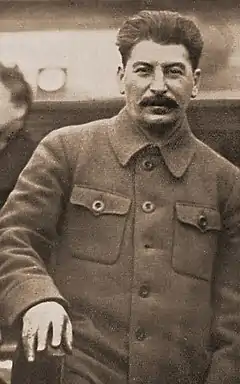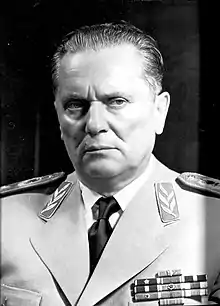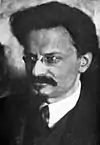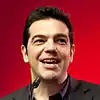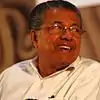List of atheists in politics and law
There have been many atheists who have participated in politics or law. This is a list of atheists in politics and law. Living persons in this list are people whose atheism is relevant to their notable activities or public life, and who have publicly identified themselves as atheists.
![]()
Africa
- Zackie Achmat (1962–): South African anti-Apartheid activist and HIV campaigner.[1]
- Kareem Amer (1984–): Egyptian political activist.
- Alex Erwin (1948–): South African politician, the country's Minister of Public Enterprises from 2004 to 2009.[2]
- Nadine Gordimer (1923–2014): South African anti-Apartheid political activist.[3]
- Maikel Nabil Sanad (1985–): Egyptian political activist.[4]
- Joe Slovo (1926–1995): South African Communist politician, leader of the South African Communist Party and leading member of the African National Congress.[5]
- Ronnie Kasrils (1938–): South African anti-Apartheid politician.
- Richard Leakey (1944–): Kenyan politician, conservationist and paleoanthropologist.[6]
- Samora Moisés Machel (1933–1986): Mozambican socialist revolutionary.
- Mengistu Haile Mariam (1937–): Ethiopian politician and military dictator.
- Kingunge Ngombale–Mwiru (1930–2018): Tanzanian politician.
Asia
Afghanistan
- Nemat Sadat (1979–): Ex-Muslim[7] LGBT Rights Activist,[8] journalist and writer, former professor of American University of Afghanistan.[9]
Cambodia
China
- Xi Jinping (1953–): Chinese politician currently serving as General Secretary of the Communist Party of China, President of the People's Republic of China, and Chairman of the Central Military Commission.
- Hu Jintao (1942–): Chinese politician who was the paramount leader of the People's Republic of China from 2002 to 2012. He held the offices of General Secretary of the Communist Party from 2002 to 2012, President of the People's Republic of China from 2003 to 2012 and Chairman of the Central Military Commission from 2004 to 2012. He was a member of the Politburo Standing Committee, China's de facto top decision-making body, from 1992 to 2012.
- Jiang Zemin (1926–): Chinese communist politician, General Secretary of the Communist Party of China 1989–2002 and President of the People's Republic of China 1993–2003. In June 1999, Jiang established an extralegal department, the 6-10 Office, to expel Falun Gong from mainland China. On 20 July, security forces abducted and detained thousands of Falun Gong organizers they identified as leaders. The persecution of Falun Gong that followed was characterized a nationwide campaign of propaganda, as well as the large-scale arbitrary imprisonment and coercive reeducation of Falun Gong organizers, sometimes resulting in death.[11]
- Deng Xiaoping (1904–1997): Chinese politician. He was the paramount leader of the People's Republic of China from 1978 until his retirement in 1989.[12]
- Mao Zedong (1893–1976): Chinese military and political leader, Chairman of the Communist Party of China, who led the Communist Party of China to victory in the Chinese Civil War, and was the leader of the People's Republic of China from its establishment in 1949 until his death in 1976. Under his leadership, China officially became an atheist state.[13][14][15][16]
- Hua Guofeng (1921-2008): Chinese politician and paramount leader of China until 1978.
India
- Periyar E.V. Ramasamy, known as Periyar (1879–1973): Social reformer and politician, the 'Socrates of Southern Asia', who founded the Self-Respect Movement and Dravidar Kazhagam.[17]
- Vinayak Damodar Savarkar, known as Savarkar (1883–1966): Indian independence activist, politician, lawyer, writer, and the formulator of the Hindutva philosophy.[18][19]
- Jawaharlal Nehru (1889–1964): India's first Prime Minister and a secular-described "scientific humanist" who disavowed belief in gods.[20]
- Sahodaran Ayyappan (1889–1969): Co-founder of the modern atheist movement in Kerala state in India, and minister in Travancore-Cochin government.
- Goparaju Ramachandra Rao, Well known as Gora (1902–1975) Social reformer, founded Atheist Centre on the principles of positive Atheism.Participated in Indian freedom movement, preached atheism.
- M.A. John (1936-2011): Leader of Indian National Congress and atheist.
- Subhashini Ali (1947–): Marxist politician and President of the All India Democratic Women's Association.[21]
- Kanimozhi (1968–): Politician and poet, and daughter of the Tamil Nadu Chief Minister M. Karunanidhi.[22]
- M. Karunanidhi (1924–2018): Ex-Chief Minister of Tamil Nadu.[23][24]
- M.K.Stalin (1953–)
- Manabendra Nath Roy (1887–1954): Born Narendra Nath Bhattacharya, popularly known as M. N. Roy, was a Bengali Indian revolutionary, internationally known political theorist and activist, founder of the Communist parties in Mexico and India. He later denounced communism and became an exponent of the philosophy of radical humanism.[25]
- Bhagat Singh (1907–1931): Marxist revolutionary, wrote a pamphlet entitled Why I am an atheist.[26]
- Harkishan Singh Surjeet (1916–2008): Politician, General Secretary of the Communist Party of India (Marxist) from 1992 to 2005 and a member of the party's Polit Bureau from 1964 to 2008.[27]
- A. K. Gopalan (1904–1977): Communist leader from Kerala and former Leader of the Opposition (India).
- E. M. S. Namboodiripad (1909–1998): Politician, renowned socialist and a Marxist theorist, first Chief Minister of Kerala. He also became the leader of the first democratically elected communist government in the world.
- K.N. Ramachandran (1937–): Naxalite leader and General Secretary of Communist Party of India (Marxist Leninist) Red Star
- Prakash Karat (1948–): Politician, The General Secretary of the Communist Party of India (Marxist) from 2005 to 2015.
- Siddaramaiah (1948–): Chief Minister of Karnataka elected to office in 2013.[28]
- E. K. Nayanar (1918–2004): Politician, former Chief Minister of Kerala [29]
- A. K. Antony (1940–): Politician, former Chief Minister of Kerala
- V. S. Achuthanandan (1923–): Politician, former Chief Minister of Kerala
- Pinarayi Vijayan (1944–): Politician, current Chief Minister of Kerala
- Kamal Haasan (1954–): Politician, President of Makkal Needhi Maiam, Actor
- Manoj John (1972–): Former Naxalite and member of Communist Party of India (Marxist-Leninist) Red Star, and current Director[30][31] of Atheist Alliance International, an organisation having consultative status at the United Nations.[32]
- V.T. Balram (1978–): Indian law-maker representing Indian National Congress who supported Amnesty International in a controversy involving Hindu nationalist student organisation ABVP.[33]
Middle East
- Uri Avnery (1923–2018): German-born Israeli journalist, left-wing peace activist, and former Knesset member.[34]
- David Ben-Gurion (1886–1973): Polish-Israeli politician; a founder and the first Prime Minister of Israel.[35][36][37][38][39][40][41]
- Moshe Dayan (1915–1981): Israeli military leader and politician. The fourth Chief of Staff of the Israel Defense Forces (1953–58). He went on to become Defense Minister and later Foreign Minister of Israel.[36][37]
- George Hawi (1938–2005): Lebanese politician and former secretary general of the Lebanese Communist Party.[42]
- Golda Meir (1898–1978): Israeli politician who became the fourth Prime Minister of Israel.[37]
- Yitzhak Rabin (1922–1995): Israeli politician, statesman and general. He was the fifth Prime Minister of Israel. He won the 1994 Nobel Peace Prize together with Shimon Peres and Yasser Arafat.[43]
North Korea
- Kim Il-sung (1912-1994): Founder of North Korea and the Juche ideology, Supreme Leader from 1948 to 1994.
- Kim Jong-il (1942-2011): Supreme Leader from 1994 to 2011.
- Kim Jong-un (1983-): Supreme Leader since 2011.
Vietnam/North Vietnam
- Ho Chi Minh (1890-1969): North Vietnamese leader who served as General Secretary of the Communist Party of Vietnam from 1956 to 1960.
- Xuan Thuy (1912–1985): North Vietnamese political figure, foreign minister for North Vietnam 1963–65, official leader of the delegation to the secret talks with Henry Kissinger, and the main negotiator at the earliest meetings with Kissinger.[44]
Oceania
Australia
- Montague Miller (1839–1920): unionist, secularist and revolutionary socialist.[45]
- William Trenwith (1846–1925): trade union official and labour movement politician.[46]
- Frederick Vosper (1869–1901): newspaper journalist and proprietor, and politician, known for his ardent views and support of Australian republicanism, federalism and trade unionism.[47]
- Sir John Latham (1877–1964): Chief Justice of Australia (1935–1952).[48]
- Lionel Murphy (1922–1986): Justice of the High Court (1975–1986).[49]
- Bill Hayden (1933–): Governor-General of Australia (1989–1996).[50][51] Converted to Catholicism in 2018.
- Alan Carpenter (1957–): Premier of Western Australia (2006–2008).[52]
- Julia Gillard (1961–): Prime Minister of Australia (2010–2013).[53][54]
New Zealand
- Norman Douglas (1910–1985): Labour Party politician.[55]
- Sir Dove-Myer Robinson (1901–1989): Politician, Mayor of Auckland from 1959–1965 and 1968–1980.[56]
Europe with Russia/USSR
Albania
- Ben Blushi (1969–): Politician, former minister, writer and journalist.
- Dritëro Agolli (1931–2017): Poet, writer and politician.[57]
- Diana Çuli (1951–): Writer, journalist and politician.
- Gilman Bakalli (1967–2016): Professor, politician, pundit, and writer.[58]
- Enver Hoxha (1908–1985): Communist ruler who declared Albania the first atheist state, and who has been identified as an "arch-atheist."[59][60][61]
- Hysen Hoxha (1861–1934) Politician, mayor of Gjirokastër, part of the Gjirokastra delegation for the Assembly of Vlorë.
Belgium
- Elio Di Rupo (1951–): Belgian politician, social democratic Belgian prime minister between 2011 and 2014, describes himself as an atheist, rationalist and Freemason.[62]
- Karel De Gucht (1954–): European Commissioner between 2009 and 2014.[63]
- Siegfried Bracke (1953–): President of the Chamber of Representatives between 2014 and 2019.[64]
Denmark
- Edvard Brandes (1847–1931): Politician, critic and author, Minister of Finance 1909–1910 and 1913–1920.[65]
- Thorvald Stauning (1873–1943): Prime minister 1924–1926 and 1929–1942.
- Vilhelm Buhl (1881–1954): Prime minister May–November 1942 and May–November 1945.
- Hans Hedtoft (1903–1955): Prime minister 1947–1950 and 1953–55.
- H. C. Hansen (1906–1960): Prime minister 1955–1960.
- Jens Otto Krag (1914–1978): Prime minister 1962–1968 and 1971–1972.[66]
Finland
- Erkki Tuomioja (1946–): politician, Minister of Foreign Affairs 2011–2015
- Rosa Meriläinen (1975–): politician and author
- Jussi Halla-aho (1971–): Leader of the Finns Party and Member of the European Parliament (MEP)
France
- Georges Clemenceau (1841–1929): Statesman, physician and journalist, prime minister of France 1906–1909 and 1917–1920. Led France during World War I and was one of the major proponents of the Treaty of Versailles.[67]
- Pierre Joseph Proudhon (1809–1865): Politician, mutualist philosopher and socialist. He was a member of the French Parliament, and he was the first person to call himself an "anarchist".[68]
- Gilbert Romme (1750–1795): Politician and mathematician who developed the French Republican Calendar.[69]
- Marie-Jean Hérault de Séchelles (1759–1794): 4th and 24th President of the National Convention. First known atheist head of state ever.[70]
- François Hollande (1954–): President of France.[71]
Germany
- Martin Bormann (1900-1945): Nazi official and right-hand man of Adolf Hitler.[72][73][74]
- Friedrich Engels (1820-1895): 19th-century philosopher and political scientist, often regarded as the co-founder of Communism.[75]
- Erich Honecker (1912–1994): Communist politician and leader of East Germany.
- Alfred Rosenberg (1893-1945): Leader of NSDAP Office of Foreign Affairs[76][77]
- Karl Marx (1818–1883): 19th-century philosopher, political economist, sociologist, political theorist, often called the father of Communism.[78]
- Kurt Schumacher (1895–1952): Social democratic politician who served as chairman of the Social Democratic Party of Germany from 1946 and was the first Leader of the Opposition in the West German Bundestag from 1949 until his death.[79]
- Walter Ulbricht (1893-1973): Communist politician and leader of East Germany.
- Sahra Wagenknecht (1969–): Left-wing politician (Die Linke)[80]
Greece
- Alexis Tsipras (1974–): Leader of Syriza and Prime Minister of Greece from 26 January 2015 to 8 July 2019.
- Yanis Varoufakis (1961–): Minister of Finance from 27 January 2015 to 6 July 2015.
Ireland
- Clare Daly (1968–): United Left Alliance, Teachta Dála[81]
- Jim Kemmy (1936–1997): Socialist politician.[82]
- Ivana Bacik (1968–): Senator and Deputy Leader of the Seanad[83][84]
- Proinsias De Rossa (1940–): Politician, former President of the Workers' Party, leader of Democratic Left, and later a senior member of the Labour Party.[85]
- Hanna Sheehy-Skeffington (1877–1946): Suffragist and nationalist.[86]
- Owen Sheehy-Skeffington (1909–1970): University lecturer and Senator.[87]
- William Thompson (1775–1833): Socialist and economist.[88]
- Joe Higgins (1949–): Socialist Party politician. In the 2011 general election he was elected to Dáil Éireann as Teachta Dála (TD) for the Dublin West constituency, having previously served in that capacity from 1997–2007.[1] He was also a Member of the European Parliament (MEP) for the Dublin constituency from 2009 to 2011, the first Socialist Party MEP.[89]
Italy
- Giorgio Napolitano (1925–): Politician, 11th President of Italy.
- Sandro Pertini (1896–1990): Politician, 7th President of Italy.
- Giuseppe Saragat (1898–1988): Politician, 5th President of Italy.
- Massimo D'Alema (1949–): Politician, 53rd Prime Minister 1998–2000, Minister of Foreign Affairs and Deputy Prime Minister in the Prodi II Cabinet 2006–2008.
- Giuliano Ferrara (1952–): Politician, journalist, and occasional talk show host.[90]
- Nilde Iotti (1920–1999): Politician, the first woman to become president of the Italian Chamber of Deputies for three consecutive legislatures 1979–1992.[91]
- Pietro Nenni (1891–1980): Politician, the leader of Italian Socialist Party 1931–1945 and 1949–1963, Deputy Prime Minister (Moro I, II and III cabinet), Minister of Foreign Affairs (De Gasperi II Cabinet, Rumor I Cabinet)
- Benito Mussolini (1883–1945): Fascist dictator of Italy.[92][93][94][95]
- Palmiro Togliatti (1893–1964): Politician, the leader of Italian Communist Party from 1927 to his death in 1964.[96]
- Emma Bonino (1948–): Politician, European Commissioner 1995–1999, Minister of Foreign Trade and European Affairs 2006–2008, Deputy Speaker of Italian Senate 2008–2013 and Minister of Foreign Affairs 2013–.
The Netherlands
- Ayaan Hirsi Ali (1969–): Somali-Dutch feminist and atheist activist, writer and politician who is known for her views critical of Islam, practices of circumcision and female genital cutting.[97]
- Ronald Plasterk (1957–): Politician of the Labour Party (PvdA) and former molecular geneticist. He is Minister of the Interior and Kingdom Relations in the Cabinet Rutte II and was previously Minister of Education, Culture and Science from February 22, 2007 until February 23, 2010 in the Cabinet Balkenende IV.[98]
- Diederik Samsom (1971–): Member of the Labour Party (Partij van de Arbeid) and he has been an MP since January 30, 2003.[99]
Poland
- Władysław Gomułka (1905–1982): Communist leader.[100]
- Aleksander Kwaśniewski (1954–): former President of Poland (1995–2005).[101]
- Zbigniew Religa (1938–2009): prominent cardiac surgeon, pioneer in human heart transplantation and a Minister of Health of the Republic of Poland.[102]
- Włodzimierz Cimoszewicz (1950–): former Prime Minister of Poland (1996-1997)[103]
- Gabriel Narutowicz (1865–1922) : first President of Poland (1922).
- Robert Biedroń (1975–): Mayor of Słupsk, member of parliament, LGBT rights activist.
- Bolesław Bierut (1892-1956): Communist leader.
Romania
- Remus Cernea (1974–): Activist against discrimination based on faith and religion, an advocate of the separation of church and state.
Russia/Soviet Union
- Leonid Brezhnev (1906-1982): Soviet politician who was leader of the Soviet Union from 1964 until his death in 1982.
- Vladimir Ilyich Lenin (1870–1924): Marxist revolutionary and leader of the Bolsheviks. Lenin considered atheism and anti-religious propaganda to be essential to promoting communism.[104]
- Nikita Khrushchev (1894–1971): Soviet General Secretary, 1953–1964.[105][106]
- Joseph Stalin (1878–1953): General Secretary of the Communist Party of the Soviet Union's Central Committee from 1922 until his death in 1953.[107]
- Leon Trotsky (1879–1940): Marxist theorist and Soviet politician.[108]
Spain
- Santiago Casares Quiroga (1884–1950): Politician, Prime Minister of Spain from May 13 to July 19, 1936.[109]
- Pedro Sánchez (1972–): Politician, Prime Minister of Spain since June 1, 2018.[110]
- Manuel Azaña (1880-1940): Prime Minister of Spain, 1931-1936.
Sweden
- Olof Palme (1927–1986): politician, two-term Prime Minister of Sweden, heading a Privy Council Government from 1969 to 1976 and a cabinet government from 1982 until his death.[111]
- Bengt Westerberg (1943–): Leader of the Liberal People's Party from 1983 to 1995. Minister for Social Affairs and Deputy Prime Minister from 1991 to 1994. Currently holds office as the Deputy President of the International Federation of Red Cross and Red Crescent Societies in Geneva, Switzerland.[112]
- Hanif Bali (1987–): politician of the Moderate Party and member of the Swedish Riksdag.
Turkey
- Abdullah Cevdet (1869–1932), Turkish intellectual and physician of ethnic Kurdish descent, who was a politician of the Committee of Union and Progress between 1889 and 1908 and then the Ottoman Democratic Party between 1908 and 1911.
- Kemal Atatürk (1881–1938), Marshal of the Turkish Armed Forces and the founder of the Turkish Republic.[113][114][115][116][117]
- Behice Boran (1910–1987), Turkish Marxist politician, author, and sociologist, who was elected deputy of the Workers' Party of Turkey between 1965 and 1969.
- Bedri Baykam (1957–), Turkish artist and elected member of the Party Assembly of the social-democratic Republican People's Party between 1995 and 1998.
United Kingdom
Being non-religious has traditionally not been a barrier to success in British politics, as evidenced by three Prime Ministers, one Deputy Prime Minister, one First Minister of Wales, and several leaders of the Opposition being atheists since the 20th century. Non-religious views are common among British MPs and Lords, many of whom are members of the All-Party Parliamentary Humanist Group, as well as members of Scottish, Welsh, Northern Irish, and London legislatures.
- Ramsay Macdonald (1866–1937): Scottish politician who became the first Labour Prime Minister of the United Kingdom. Although devoutly religious in his childhood and as an early adult, he became a very involved member of the Union of Ethical Societies (an early humanist organisation, now known as Humanists UK) later on.[118][119][120][121]
- Guy Aldred (1886–1963): English anarchist communist and a prominent member of the Anti-Parliamentary Communist Federation.[122]
- William Crawford Anderson (1877–1919): British socialist politician, a founder member of the Union of Democratic Control.[123]
- James Arbuthnot (1952–): Conservative MP 1987-2015 and peer since 2015.[124]
- Edward Aveling (1849–1898): English Marxist activist and partner of Karl Marx's daughter Eleanor.[125]
- Bessie Braddock JP (1899–1970): British Labour politician, vice-chairman of the party in 1968.[126]
- Charles Bradlaugh (1833–1891): Liberal politician and one of the most famous English atheists of the 19th century.[127]
- Alastair Campbell (1957–): Director of Communications and Strategy for the Prime Minister of the United Kingdom from 1997 to 2003.[128][129]
- James Cleverly (1969–): MP for Braintree from 2015 to present.[130]
- Michael Cashman (1950–): British actor turned Labour politician, a former Member of the European Parliament (1999–2014).[131]
- Colin Challen (1953–): British Labour politician, Member of Parliament (2001–2010).[132]
- Charles Clarke (1950–): British Labour Party politician, a Member of Parliament since 1997 and former Home Secretary.[133]
- Nick Clegg (1967–): former Deputy Prime Minister of the United Kingdom, Lord President of the Council (with special responsibility for political and constitutional reform), and the British Liberal Democrat Leader from 2007 to 2015.[134][135]
- Robin Cook (1946–2005): Secretary of State for Foreign & Commonwealth Affairs of the UK (1997–2001), whose funeral service was held in the High Kirk of Scotland, where he was described as a "Presbyterian atheist. "[136]
- Meghnad Desai, Baron Desai (1940–): British economist, writer and Labour politician.[137]
- Donald Dewar (1937–2000): British Politician and Scottish first minister, from May 1999 until his sudden death in October 2000[138]
- Frank Dobson (1940–2019): British Labour politician and member of Parliament for Holborn and St. Pancras.[139]
- Jack Dormand (1919–2003): British educationist and Labour politician.[140]
- Herbert Fisher OM (1865–1940): English historian, educator, and Liberal politician.[141]
- Donald Findlay QC (1951–): Senior Scottish advocate and Queen's Counsel.[142]
- Shreela Flather, Baroness Flather (1934–): British Conservative peer in the House of Lords, the first Asian woman to receive a peerage.[143]
- Michael Foot (1913–2010): British politician and writer, leader of the Labour Party 1980–1983.[144]
- Sir George Taubman Goldie (1846–1925): Manx administrator who, as founder of the Royal Niger Company, played a major role in the founding of Nigeria.[145]
- Evan Harris (1965–): British Liberal Democrat politician and former MP.[146]
- Roy Hattersley PC (1932–): British Labour Party politician, author and journalist, Deputy Leader of the Labour Party 1983–1992.[147]
- Douglas Houghton PC CH (1898–1996): British Labour politician.[148]
- Robert Hughes, Baron Hughes of Woodside (1932–): British Labour politician.[149]
- Tommy Jackson (1879–1955): English founder of the Socialist Party of Great Britain and later the Communist Party of Great Britain.[150]
- Joel Joffe, Baron Joffe CBE (1932–2017): South Africa-born British Labour peer in the House of Lords.[151]
- Oona King, Baroness King of Bow (1967–): Labour peer in the House of Lords, former MP for Bethnal Green and Bow (1997–2005).[152]
- Neil Kinnock PC (1942–): British Labour politician, Leader of the Opposition and Labour Party leader 1983–1992.[153]
- Ken Livingstone (1945–): Mayor of London 2000–08.[154]
- Gus Macdonald, Baron Macdonald of Tradeston CBE, PC (1940–): British Labour politician.[155]
- John Maxton, Baron Maxton (1936–): Scottish politician, MP and now member of the House of Lords.[156][157]
- David Miliband (1965–): British Labour politician, Foreign Secretary from 2007 to 2010.[158]
- Ed Miliband (1969–): British Labour politician, Leader of the Opposition and Leader of the Labour Party from 2010 to 2015.[159]
- Rhodri Morgan (1939–2017), former First Minister of Wales and leader of Welsh Labour (2000-2009).[160][161]
- Julie Morgan (1941–): Welsh Assembly Member for Cardiff North and former MP for Cardiff North.[162]
- John Morley, 1st Viscount Morley of Blackburn OM, PC (1838–1923): British Liberal statesman, writer and newspaper editor.[163]
- Mo Mowlam (1949–2005): Former Secretary of State for Northern Ireland.[164]
- Elaine Murphy, Baroness Murphy (1949–2005): British politician and a member of the House of Lords, and a doctor and academic, formerly Professor of Psychiatry of Old Age at Guy's Hospital.[165]
- Marion Phillips (1881–1932): Australia-born Labour Party politician and British Member of Parliament.[166]
- Phil Piratin (1907–1995): British member of the Communist Party of Great Britain (CPGB) and one of their few Members of Parliament.[167]
- Herbert Samuel, 1st Viscount Samuel (1870–1963): Liberal Party Leader 1931–1935.
- Phil Sawford (1950–): British politician and former Member of Parliament for Kettering.[168]
- Brian Sedgemore (1937–2015): former left-wing British Labour Party politician.[169]
- Clare Short (1946–): British politician, former Labour Secretary of State for International Development.[170]
- Dennis Skinner (1932–): British politician, who was the Labour Member of Parliament for Bolsover from 1970 until he lost his seat in 2020.[171]
- Peter Tatchell (1952–), Australian-born British human rights activist[172]
- Phillip Whitehead (1937–2005): British Labour politician, television producer and writer.[173]
Other in Europe
- Gaudenz Canova (1887–1962): Swiss lawyer and Social Democratic member of the National Council of Switzerland from Graubünden (Grisons).[174]
- Dimitris Christofias (1946–2019): Greek Cypriot politician, President of Cyprus 2008–2013.[175]
- Vaso Čubrilović (1897–1990): Bosnian student, a conspirator in the assassination of Archduke Franz Ferdinand of Austria.[176]
- Theodor Herzl (1860–1904): Austro-Hungarian Jewish journalist and founder of modern political Zionism.[177]
- Zoran Janković (1953–): Slovenian businessman, former mayor of Ljubljana, the capital of Slovenia, and a deputy.[178]
- Alexander Lukashenko (1954–): President of Belarus, describes himself as "an Orthodox atheist. "[179]
- Slobodan Milošević (1941–2006): Serbian politician, former President of Serbia and of Yugoslavia.[180]
- Ivica Račan (1944–2007): Prime Minister of Croatia (2000–2003), former Croatian leftist politician who led the Social Democratic Party of Croatia between 1989 up to 2007. He was also the last leader and democratic transformer of the League of Communists of Croatia.[181]
- Hedi Stadlen (1916–2004): Austrian Jewish political activist, philosopher and musicologist.[182]
- Veton Surroi (1961–): Kosovo Albanian publicist and politician.[183]
- Erkki Tuomioja (1946–): Finnish politician, Minister for Foreign Affairs 2000–2007 and 2011–2015.[184]
- Josip Broz Tito (1892–1980) 1st President of Yugoslavia
- Zoran Milanović (1966–): Prime Minister of Croatia (2011-2016) and 5th President of Croatia (2020-)
- Miloš Zeman (1944–): President of the Czech Republic
North America
Canada
- Gilles Duceppe (1947–): Politician, Leader of the Opposition twice from 1996 to 1997 and Leader of the Bloc Québécois from 1997 to 2011.[185]
- Dale Jackaman (1956–): Politician.[186]
- Pauline Marois (1949–): Premier of Quebec from 2012 to 2014, leader of Parti Québécois from 2007 to 2014.[187][188]
- Françoise David (1948–): Spokesperson and MNA for Quebec Solidaire.
Cuba
- Fidel Castro (1926-2016): First Secretary of the Communist Party of Cuba, Prime Minister of Cuba, and President of Cuba, all from 1959 to 2011.[189]
- Raúl Castro (1931-): First Secretary of the Communist Party of Cuba since 2011.
Mexico
- Carlos A. Madrazo (1915–1969): Politician.
- Narciso Bassols (1897–1959): Politician.
- Lázaro Cárdenas (1895–1970): Former President of Mexico.[190]
- Venustiano Carranza (1859–1920): Former President of Mexico.[191]
- Plutarco Elías Calles (1877–1945): Former President of Mexico.[192][193]
- Tomás Garrido Canabal (1891–1943): Politician.
- Benito Juarez (1806–1872): Former President of Mexico.
- Alvaro Obregon (1880–1928): Former President of Mexico.
United States
- Rocky Anderson (1951–): 2012 Justice Party Presidential Candidate and former mayor of Salt Lake City, Utah[194]
- Cecil Bothwell (1950–): Asheville, North Carolina city council member, who was nearly denied his position because of his atheism.
- Lori Lipman Brown (1958–): politician, lobbyist, lawyer, educator, and social worker supporter, Nevada state senator from 1992 to 1994.[195]
- Douglas Campbell (1959–): atheist advocate and member of the Green Party of Michigan and of the Godless Americans Political Action Committee.[196] Co-founder, Michigan Godless Americans Political Action Committee.[197] Green Party candidate for governor of Michigan in both 2002 and 2006.
- Ernie Chambers (1937–): Member of the Nebraska Legislature and civil rights activist.[198]
- Clarence Darrow (1857–1938): lawyer and leading member of the American Civil Liberties Union, best known for defending John T. Scopes in the so-called Monkey Trial.[199][200][201]
- Sean Faircloth (c. 1960–): attorney, served five terms in the Maine Legislature including appointments on the Judiciary and Appropriations Committees.
- Barney Frank (1940–): U.S. Representative (1981–2013) (D-MA).[202][203]
- Thomas Gore (1870–1949): United States Senator (D-OK), from 1907 until 1921 and from 1931 until 1937.[204]
- Vincent Hallinan (1896–1992): lawyer who ran for president of the United States in 1952 under the Progressive Party, the third highest polling candidate in the election.[205]
- Jared Huffman (1964–): United States Congressman (D-CA) since 2013. He revealed in 2017 that he is a humanist and a non-believer.[206]
- Heather Mac Donald (1956–): writer and lawyer, member of the Manhattan Institute and author of The Burden of Bad Ideas: How Modern Intellectuals Misshape Our Society.[207]
- Culbert Olson (1876–1962): politician and Governor of California from 1939 to 1943.[208]
- Pete Stark (1931–2020): U.S. Representative (1973–2013) (D-CA), the first openly atheist member of Congress.[209]
- Eddie Tabash: lawyer and atheist activist and debater.[210]
- Jesse Ventura (1951–): former Governor of Minnesota, veteran, wrestler, actor, and talk show host.[211][212][213]
- George Will (1941–): newspaper columnist and political commentator[214]
- Alan Wolfe (1951–): Political scientist and sociologist, director of the Boisi Center for Religion and American Public Life.[215]
- Andrew Zwicker (1964–): Member of the New Jersey General Assembly; scientist and educator, Princeton Plasma Physics Laboratory.[216]
- Juan Mendez (1985–): State Senator for Arizona.[217]
South America
Argentina
- Carmen Argibay (1939–2014): Lawyer, a member of the Argentine Supreme Court of Justice, the first woman to be nominated for the Court by a democratic government in Argentina.[218]
Guyana
- Janet Jagan (1920–2009): American-born socialist politician, Prime Minister and then President of Guyana.[219]
Paraguay
- José Gaspar Rodríguez de Francia (1766–1840): Dictator of Paraguay between 1814 and 1840.[220]
Uruguay
- José Mujica (1935–): Politician and President of Uruguay from 2010 to 2015.[221]
Notes and references
- Gill, Peter (2010). Body Count: How they turned AIDS into a catastrophe. London: Profile Books. ISBN 9781847651082.
- "Although Hurley's ecumenical links stopped short of the Communist Party, Alec Erwin, today's South African Minister of Trade and Industry, recalled their friendship in anti-apartheid days, though Erwin was an atheist and "he knew of my support for the Communist cause"." Randolph Vigne, 'Obituary: Archbishop Denis Hurley, Progressive South African Prelate', The Independent (London), February 25, 2004, Pg. 34.
- Paris Review, Interview with Gordimer Archived 2008-05-28 at the Wayback Machine.
- "Maikel Nabil Sanad مايكل نبيل سند: About me". Maikelnabil.com. 2010-12-05. Retrieved 2011-08-14.
- "OBITUARY: Joe Slovo". The Independent. London. 7 January 1995.
Although Joe grew up in a religious household, he became an atheist while retaining respect for "the positive aspects of Jewish culture".
- Leakey, Leakey (1983). One Life: An Autobiography. (p. 38)
- http://nematsadat.blogspot.com/2015/06/when-gay-marriage-reaches-eastern-world.html
- "Afghanistan's 'coming out' for LGBT rights can pave the road to peace". Public Radio International. Retrieved 2019-08-28.
- "Archived copy". Archived from the original on 2016-01-20. Retrieved 2016-03-13.CS1 maint: archived copy as title (link)
- "Democratic Kampuchea was officially an atheist state, and the persecution of religion by the Khmer Rouge was matched in severity only by the persecution of religion in the communist states of Albania and North Korea, so there were not any direct historical continuities of Buddhism into the Democratic Kampuchea era." Millennialism, Persecution, and Violence: Historical Cases, p. 282
- "No one expects China's position on Tibet to become any more negotiable than it has been. But in one revealing moment, Mr Jiang gave a glimpse of the difficulties Peking has in understanding why other countries abhor its policies in Tibet. "I myself am an atheist", he said. "During my visit to the US last year and during my previous visit to European countries, I found that although the education, science and technology have developed to a very high level and the people are now enjoying modern civilisation, still quite a number of them have a belief in Lamaism." Teresa Poole, 'Jiang keeps channels open to Dalai Lama', The Independent (London), June 28, 1998, Pg. 16.
- Deng is quoted as saying, "Administrative means should not be applied to religion; but meanwhile, religious fanaticism should not be encouraged either, otherwise religion will be antagonistic to socialism, as well as to the interests of the people." Marxism and Religion, p. 338
- "With revolution came a new, atheist regime – one that frowned on all religious belief." China's Catholics: Far from Rome, by Holly Williams, BBC News, December 24, 2003, (Accessed April 14, 2008)
- "...Mao was an atheist..." Death Ritual as Political Trickster in the People's Republic of China, by A. P. Cheater, Source: The Australian Journal of Chinese Affairs, No. 26 (Jul., 1991), pp. 67-97 (p. 92), published by Contemporary China Center, Australian National University
- "Mao is not only a historical figure, of course, but is part of the (tattered) web of legitimacy on which the People's Republic rests. He is part of the founding mythology of the Chinese government, the Romulus and Remus of "People's China", and that's why his portrait hangs in Tiananmen Square. Even among ordinary Chinese, Mao retains a hold on the popular imagination, and some peasants in different parts of China have started traditional religious shrines honoring him. That's the ultimate honor for an atheist – he has become a god." 'Mao': The Real Mao, Nicholas D. Kristof, The New York Times, October 23, 2005 (Accessed April 25, 2008)
- Mao is quoted as saying, "Religion is poison. Firstly it reduces the population, because monks and nuns must stay celibate, and secondly it neglects material progress." Dalai Lama, Freedom in Exile, pp. 98-99
- "On religion, Periyar used both lip and pen rationally and forcefully. He was convinced that people used religion only as a mask to deceive the innocent people. Periyar proclaimed himself as a vowed atheist. Puranas, shastras and smritis were the target of his vociferous condemnation. He firmly asserted that these were responsible in making the public feel hardy and superstitious. At one stage, he asserted that the meaningless religious treatises must be burnt. He believed that belief in God dampens the natural human qualities such as initiatives, perseverance and enthusiasm. Fear of God is the beginning of one's own foolishness. Periyar attacked mainly Hinduism and its gods, because they are the greatest enemy of human equality and liberty. He felt that if a person should live with self-respect he must do away with religion." Louis Antony, com/louis.pdf Political Philosophy of Periyar (pdf), Pg. 27.
- Kumar, Pramod (1992). Towards Understanding Communalism. Chandigarh: Centre for Research in Rural and Industrial Development. p. 348. ISBN 978-81-85835-17-4.
- This was of a piece with Savarkar's personal life, in which he was fiercely atheist. He had publicly said there was nothing sacred about cows and advised Hindus to give up vegetarianism. Savarkar's biographer, Dhananjay Keer, points out that when his wife died, despite entreaties by his followers he refused to allow any Hindu rituals. Political psychologist Ashis Nandy, who has shed light on Savarkar's paradoxical relationship with religion, writes, "Savarkar's atheism was not the philosophical atheism associated with Buddhism and Vedanta, but the anti-clerical, hard atheism of fin-de-siecle scientism, increasingly popular among sections of the European middle class and, through cultural osmosis, in parts of modern India." Ronojoy Sen, Times News Network: 'Atheist fundamentalists', Times of India, June 5, 2010 (accessed May 16, 2019).
- "There are religions that have very rigid rules and there are others that don't. Religion is something that I, as a person, am not interested in. I have always been an atheist. My parents were atheists. It doesn't bother me if somebody is religious. My problem is when religion is used to institutionalise other things." The Rediff Interview/ Subhasini Ali, August 8, 2001 (accessed April 21, 2008).
- "It may be 60 years since the DMK broke away from the Dravidar Kazhagam, but some affinities run very deep, and across generations. Poet turned-politician Kanimozhi earned encomiums from DK president K Veeramani for expounding the ideals of DK founder, the late rationalist leader Periyar. The atheist in her was in full flow as she spoke at the DK's youth wing conference and posed some trenchant questions to believers and went on to express concern over the present-day youth's understanding of the Dravidian movement and its contribution. Veeramani was so impressed that he not only gave her 100 out of 100 in rationalist philosophy. And he laid claim to priority in her ideological loyalty. "You belong to us first, and then only to the DMK", he exulted." The rationalist poet, Times of India, 8 September 2008 (accessed 9 September 2008).
- "For the AIADMK enthusiasts, there is no conflict of ideologies. Their leader, the late M. G. Ramachandran, was an atheist turned ardent Mookambikai devotee. But, for the activists of the DMK, whose leader, M. Karunanidhi, is a sworn atheist, it is a tussle between personal beliefs and the party's ideological moorings." 'Rationalism takes the back seat Archived 2008-06-05 at the Wayback Machine', The Hindu, 8 September 2002.
- "Since Karunanidhi is an atheist he seems to believe in Janatha Janardhan rather than the Janardhan (God) found in temples and places of worship." K. B. Ganapathy, 'Jaya scored a self-goal', OurKarnataka.com (accessed 9 September 2008).
- "But Roy was an atheist and fierce priest hater..." Leonard A. Gordon (February 1968). "Portrait of a Bengal Revolutionary". The Journal of Asian Studies. 27 (2): 197–216. doi:10.2307/2051747. JSTOR 2051747.
- Why I am an Atheist, Bhagat Singh, October 1930.
- "Surjeet, who always sported a white turban, was also passionately opposed to the Sikh separatist campaign that bled Punjab for a decade until 1993. An atheist, he led a spartan lifestyle and always wore simple, even crumpled clothes." M.R. Narayan Swamy and Monobina Gupta, Indo-Asian News Service: 'Harkishan Singh Surjeet – nationalist to Communist and then kingmaker', Hindustan Times, August 1, 2008 (accessed August 1, 2008).
- PTI (13 May 2013). "Siddaramaiah takes charge as Karnataka CM, unveils Rs 4,409.81 crore bonanza for poor". Indian Express. Retrieved 19 May 2013.
- "Archived copy". Archived from the original on 2016-05-08. Retrieved 2016-05-08.CS1 maint: archived copy as title (link)
- "Manoj John Elected to International Atheist Federation". Mathrubhumi Newspaper. 29 July 2020. Retrieved 15 December 2020.
- "Atheist Alliance International". 15 December 2020. Retrieved 15 December 2020.
- "Atheist Alliance International Gets UN Special Consultative Status".
- "Kerala leaders VT Balram, MB Rajesh say their children have no religion".
- "Well, I myself am a 100% atheist. And I am increasingly worried that the Israeli-Palestinian struggle, which dominates our entire life, is assuming a more and more religious character." Uri Avnery, A War of Religions? God Forbid! Archived 2007-10-21 at the Wayback Machine, Ramallah Online February 19, 2007(?) (accessed April 28, 2008).
- Zev Chafets (2008). A Match Made in Heaven: American Jews, Christian Zionists, and One Man's Exploration of the Weird and Wonderful Judeo-Evangelical Alliance. HarperCollins. p. 37. ISBN 9780060890599.
"To be a realist here, you have to believe in miracles, " David Ben-Gurion once remarked. He didn't believe that literally, of course; he was an atheist. But he insisted that his officials and generals take Old Testament names.
- Tariq Ali (2003). The Clash of Fundamentalisms: Crusades, Jihads and Modernity (2 ed.). Verso. p. 10. ISBN 9781859844571.
Ben-Gurion and Moshe Dayan were self-proclaimed atheists.
- Giulio Meotti (2011). A New Shoah: The Untold Story of Israel's Victims of Terrorism. ReadHowYouWant.com. p. 147. ISBN 9781459617414.
Even atheist and socialist Israelis like David Ben-Gurion, Moshe Dayan, and Golda Meir were marked by the stories and legends of King David and the prophets. In other words, their lives had been shaped by Hebron.
- Karen Armstrong (1997). Jerusalem: One City, Three Faiths. Random House Digital, Inc. p. 369. ISBN 9780345391681.
Even a committed atheist like Ben-Gurion found its sacred position on his own emotional map more compelling than the demographic and historical facts that were staring him in the face.
- Jonathan B. Isacoff (2006). "2". Writing the Arab-Israeli Conflict: Pragmatism And Historical Inquiry. Lexington Books. p. 54. ISBN 9780739112731.
David Ben-Gurion makes an especially fascinating study as a spokesman for Jewish messianic teleology in that by most accounts he was a secular atheist.
- Eyal Chowers (2012). The Political Philosophy of Zionism: Trading Jewish Words for a Hebraic Land. Cambridge University Press. p. 124. ISBN 9781107005945.
David Ben-Gurion (1886–1973), the first prime minister of Israel and its foremost politician in the age...Though an atheist, he saw the Bible as the most important source for shaping the new Hebrew's identity...
- Israel Shahak (1994). Jewish History, Jewish Religion: The Weight of Three Thousand Years. Pluto Press. p. 8. ISBN 9780745308197.
In 1956 I eagerly swallowed all of Ben-Gurion's political and military reasons for Israel initiating the Suez War, until he (in spite of being an atheist, proud of his disregard of the commandments of Jewish religion) pronounced in the Knesset on the third day of that war, that the real reason for it is 'the restoration of the kingdom of David and Solomon' to its Biblical borders.
- "What united them was opposition to a supposedly corrupt and pro-western administration, unfairly dominated by factions of Lebanon's Maronite Christian community. Notwithstanding his own professed atheism, Hawi, Greek Orthodox by birth, was valued as an iconic Christian figure within a coalition often painted as sectarian Muslim." Lawrence Joffe, 'Obituary: George Hawi: Lebanese communist leader who espoused Muslim-Christian dialogue', The Guardian (London)June 22, 2005, Pg. 29.
- "Rabin was an atheist. He had nothing to do with the religious calendar. Not to mention the fact that the "Jewish" calendar is really a Babylonian one, and that its months carry the names of Babylonian gods." Uri Avnery, The Real Rabin, Ma'ariv.
- "It has just been revealed that Thuy used to earn a living as a sorcerer […] he travelled around the country selling magical charms, spells and cures, and spreading Communist propaganda at the same time. This information was volunteered by a Viet Cong colonel who recently came over to the South Vietnam Government side. He said they Thuy, being an atheist, clearly did not believe in his own magical powers, but had used sorcery purely as a cover for his political work." 'Party Tricks', 'The Times Diary', The Times, June 7, 1968; pg. 8; Issue 57271; col F.
- "He became a doubter of the Christian religion at a very early age. It was the questions asked by the man Friday of Robinson Crusoe that set his analytical mind asking the why and wherefore. […] He became an atheist at 15, much to the grief of his beloved mother and the disgust of his harsh and bigoted Wesleyan father. Often in later life, when his mother found a home under his roof, he carried the "War Cry" in one pocket and "The Free Thinker" in the other." Annie Westbrook, 'Monty Miller – An Appreciation by Angela (Annie) Westbrook', International Socialist, December 1920. Archived online at http://www.takver.com/history/monty_miller.htm
- "In 1886–89 Trenwith prepared for parliament in a dozen lesser forums, assuming executive positions on the Workingman's Club, the Democratic Society, the Sunday Liberation Society and the Secularist Society. Despite his avowed atheism, he edged his way into respectable circles. In 1886, he was appointed a commissioner on the Adelaide Jubilee International Exhibition in 1887 and took a similar post on Melbourne's International Exhibition of 1888. He also sat on the provisional committee of the Working Men's College." Bruce Scates: 'Trenwith, William Arthur (Billy) (1846–1925)', Australian Dictionary of Biography, Online Edition (accessed July 16, 2008).
- "A professed atheist, he fought for causes such as republicanism, political separation for the goldfields and miners' safety; he also opposed Asian immigration." E. Jaggard, 'Vosper, Frederick Charles Burleigh (1869–1901)', Australian Dictionary of Biography Online Edition (accessed July 16, 2008).
- "Sir John Latham came from a religious family but from university was an avowed atheist". Sir John Latham: Judicial reasoning in defence of the Commonwealth, Medium.com., 21 October 2015.
- "Senator Lionel Murphy had been born into a Catholic family, although he was himself an avowed atheist." Jenny Hocking (2008), Gough Whitlam: A Moment in History, The Miegunyah Press, p. 422. ISBN 978-0-522-85705-4.
- In 1996 Hayden was recognised as the Australian Humanist of the Year with the statement that "The award is made because he has shown that an avowed atheist who describes himself as a secular humanist can occupy the position of Governor-General with mounting approval." Australian Humanist, No. 41 February, 1996
- "Being an atheist—as I am—is not a necessary pre-condition for being a humanist." in his acceptance speech for Australian Humanist of the Year, reported in Australian Humanist, No 42, May 1996
- "I'm an avowed republican and I'm an atheist". "Anthem plans too simplistic, says WA Premier". ABC News. 27 January 2006. Retrieved 11 February 2018.
- In a 2013 interview with The Washington Post, Gillard stated: "I think it would be inconceivable for me if I were an American to have turned up at the highest echelon of American politics being an atheist, single and childless." Weymouth, Lally (3 March 2013). "Lally Weymouth interviews Australian Prime Minister Julia Gillard". The Washington Post. Retrieved 4 January 2016.
- In her 2014 autobiography, My Story, Gillard stated, "Kevin had to be the leader in our alliance because I understood that I was not what Labor needed at that point: a woman, not married, an atheist." "Julia Gillard says Kevin Rudd was a man desperate for applause". The Australian. 24 September 2016. Retrieved 7 February 2016.
- "The influence of John A. Lee was reflected in his oratorical style and mannerisms, self-confidence and optimism, a sometimes scathing sense of humour, and probably his atheism." Hudson, Switzer. "Douglas, Norman Vazey 1910–1985". Dictionary of New Zealand Biography. Ministry for Culture and Heritage. Retrieved 5 April 2011.
- "Preferring his second name, he began calling himself Dove-Myer. He also rejected Judaism, becoming a lifelong atheist." Edgar, John. "Robinson, Dove-Myer 1901–1989". Dictionary of New Zealand Biography. Ministry for Culture and Heritage. Retrieved 5 April 2011.
- "Sadije Agolli: Dritëroi e kishte parashikuar vdekjen, pse vendosi të ikë" (in Albanian). Retrieved 2018-11-09.
- "Gilman Bakalli: Kam marrë kërcënime nga myslimanët. Kemi frikë të kritikojmë". Gazeta Dita. Retrieved 2018-11-09.
- Sang M. Lee writes that Albania was "[o]fficially an atheist state under Hoxha..." Restructuring Albanian Business Education Infrastructure August 2000 (Accessed June 6, 2007)
- Kamm, Henry (1993, June 10). 'Hallelujah' is heard in the arch-atheist's temple. The New York Times (Late Edition (East Coast)), p. A4. Retrieved August 27, 2007, from National Newspaper Abstracts
- "We Marxist-Leninists always understand clearly that religion is opium for the people. In no instance do we alter our view on this and we must not fall into the errors of 'religious socialism', etc." Enver Hoxha, Reflections on the Middle East, p. 358
- Jackson, Patrick (5 December 2011). "Profile: Belgium's Elio Di Rupo" – via www.bbc.co.uk.
- Muylaert, Jonas; Van Horenbeek, Jeroen. "De Gucht: "Die kutmarokkaantjes bestaan écht"". Retrieved 28 August 2019.
- Peeters, Tine. "Rik Torfs en Siegfried Bracke: "#MeToo gaat veel te ver"". Retrieved 28 August 2019.
- "Because of his Jewish origin, his atheism, and his "European", rather than "Danish", outlook, Brandes was, from the beginning of his political career, at odds with the more moderate faction of the left coalition that formed the Left Reform Party in the late 1890s." 'Brandes, Edvard', Encyclopædia Britannica Online (accessed August 1, 2008).
- "Folkekirken har brug for frisind".
- "M. Clemenceau does not belong to the Socialist party, but is nevertheless a convinced atheist. He opposes zealously the idea of God, and preaches revolt against Him." Eugne Tavernier, 'The Religious Question In France. I. A French Catholic's View', The Times, November 6, 1909; p. 5; Issue 39110; col F.
- "The meanings of the term humanism have changed significantly over the years; the use of the term in its modern sense can be found in the atheistic concept of writers such as Karl Marx and Pierre Joseph Proudhon." Burgin, David, The Humanist, Jan 1, 1994.
- "Although an atheist, Romme did not support deChristianization, nor did he regret the fall of Maximilien Robespierre." Historical Dictionary of the French Revolution, by Paul R. Hanson, Scarecrow Press, 2004, p. 281 (Accessed April 15, 2008)
- Fife, Graeme (14 November 2006). Terror. Macmillan. ISBN 9780312352240 – via Google Books.
- Elkaïm, Olivia (5 April 2012). "François Hollande : des origines protestantes hollandaises". La Vie (in French). Retrieved 3 February 2013. (In December 2011, Hollande told the French Christian magazine La Vie that he respects all religious practices but has none of his own: "En décembre dernier, François Hollande confiait à La Vie : 'Je n'ai aucune pratique religieuse. Mais je respecte toutes les confessions. La mienne est de ne pas en avoir.'")
- "Within the NSDAP (as in the German völkisch movement in general) there existed from the outset a group of old Hitler partisans who in contrast to the 'atheists' Alfred Rosenberg, Martin Bormann and others, believed in a union of National Socialism and Protestant Christianity." Martin Broszat, The Hitler State, p. 223
- "From 1938 Martin Bormann, head of the Party Chancellery and a prominent party atheist, took a leading role in trying to sever all state financial support for the churches, and to limit their legal status and activities, but the need to mobilize church support for the war effort from September 1939 led, as it did in the Soviet Union after 1941, to a limited political truce between Church and state." Richard Overy, The Dictators: Hitler's Germany, Stalin's Russia, p. 286
- "Bormann, an atheist, waged a particularly fanatical fight against the Christian Church." Karl Wilhelm Krause, Herbert Döhring, Anna Plaim, Kurt Kuch, Living with Hitler: Accounts of Hitler's Household Staff, p. 273
- "All religion, however, is nothing but the fantastic reflection in men's minds of those external forces which control their daily life, a reflection in which the terrestrial forces assume the form of supernatural forces." Friedrich Engels, Anti-Dühring, p. 353
- https://www.washingtonexaminer.com/weekly-standard/god-and-the-nazis
- https://www.youtube.com/watch?v=BTAIxPNoYv4
- Contribution to the Critique of Hegel's Philosophy of Right, 1843
- "He actually had little in common with the girl. She was devout Roman Catholic, he an atheist; she came from the mild Swabian region, he from the harsh borderlands of West Prussia; she was a singer who hardly cared about politics, he a politician who knew little about music." Kurt Schumacher: A Study in Personality and Political Behavior, by Lewis J. Edinger, Stanford University Press. 1965, p. 29 (Accessed May 4, 2013)
- http://www.sahra-wagenknecht.de/de/article/7.das_leben_leben.html Interviewer: "Gibt es bei Ihnen auch ab und an Zweifel am Atheismus? (Do you doubt your atheism from time to time?)" Sahra Wagenknecht: "Eigentlich nicht. (Not really.)"
- "Interview in the Mail with Clare Daly TD". 20 April 2013.
- "As an atheist in Ireland's most conspicuously Catholic city, and an opponent of ardent Republicanism at the height of the Troubles, Jim Kemmy never ran away from a battle. But, though vilified by opponents on issues from Northern Ireland to abortion to contraception, he survived to become the conscience of the Irish Left." Alan Murdoch, 'Obituary: Jim Kemmy', The Independent (London), September 27, 1997, Pg. 24.
- "Bacik to Speak at World Atheist Conference". Archived from the original on 2013-01-26. Retrieved 2012-03-29.
- "Directory of Members - 1919 - 2018 - Houses of the Oireachtas - Tithe an Oireachtais". www.oireachtas.ie.
- "Two weeks ago, the minister for social affairs, Proinsias de Rossa, announced the setting up of a commission on the family. He was described to me as "the social conscience of the present government, that tends to be a little Thatcherite." He is a socialist and an avowed atheist, remarkable for an Irish politician." Peter Lennon, 'Flocking to the cause', The Guardian (London), November 14, 1995, Features Pages, Pg. T4.
- "She had been a militant nationalist among the pacifist internationalist feminists, a republican among the free staters, a feminist among the nationalists, and an atheist in holy Ireland." Sybil Oldfield, 'Skeffington, Johanna Mary Sheehy- (1877–1946)', Oxford Dictionary of National Biography, Oxford University Press, 2004 (accessed May 2, 2008).
- "His parents combined Irish nationalism, atheism, feminism, pacifism, and socialism. Sheehy-Skeffington learned to think for himself, coming to share their politics, minus his mother's later abstentionist republicanism." D. R. O'Connor Lysaght, 'Skeffington, Owen Lancelot Sheehy- (1909–1970)', Oxford Dictionary of National Biography, Oxford University Press, 2004 (accessed May 6, 2008).
- "Such actions established among the Catholic population of the area a long-lived reputation for kindness and fair dealing which persisted despite his professed atheism." Noel Thompson, 'Thompson, William (1775–1833)', Oxford Dictionary of National Biography, Oxford University Press, 2004 (accessed May 6, 2008).
- Socialistworld.net. "Committee for a workers' International - Committee for a workers' International". www.socialistworld.net.
- "In his latest incarnation, Mr. Ferrara is running for Parliament on a small slate devoted to a single issue: "pro-life", which he defines loosely. An avowed atheist and nonbeliever, he has called for a "moratorium", but not a ban, on abortion, to call attention to the value of life." Rachel Donadio, 'The Atheist Urging Italy to Get Religion', New York Times, April 6, 2008 (accessed June 16, 2008).
- "A diligent pupil, she won a scholarship to Milan's prestigious Catholic university – which left no traces of religiosity. An untormented atheist, she died without a priest at her side." Donald Sassoon, 'Nilde Iotti: Italy's leading post-war woman politician and a founding mother of the republic', The Guardian, December 9, 1999, Leader Pages, Pg. 24.
- Mussolini wrote a pamphlet entitled God does not exist. Historian Denis Mack Smith wrote that Mussolini thought: "Science had proved that God did not exist and the Jesus of history was an ignorant Jew whose family thought him mad... Religion, he said, was a disease of the psyche, an epidemic to be cured by psychiatrists, and Christianity in particular was vitiated by preaching the senseless virtues of resignation and cowardice." Smith DM (1982). Mussolini: a biography. New York: Knopf.
- "Though privately Mussolini remained an anti-clerical atheist, he was quick to perceive the political advantages of a settlement with the Church." Patricia Knight, Mussolini and Fascism, p. 47
- "Mussolini was an atheist, from the most anti-clerical region in Italy. The first pamphlet he ever wrote was called 'God does not exist'. Even after he had left the Socialist party, his attacks on the Vatican and the priests continued for some years with equal vehemence." Adrian Lyttelton, The Seizure of Power: Fascism in Italy, 1919-1929, p. 346
- "Mussolini moved the motion that 'God does not exist, and for science to include religion is an absurdity'. He argued that the laws of physics that governed heat, electricity, light and sound 'respond neither to the lamentations nor to the prayers of men'." Jasper Ridley, Mussolini: A Biography, p. 25
- "Churches along the route were closed. It was said at the Vatican that this could be seen as a silent protest against an atheist's funeral on such a scale in the heart of Christian Rome." 'Communist Show Of Strength At Signor Togliatti's Funeral', The Times, August 26, 1964; pg. 7; Issue 56100; col C.
- Choudhury, Sohail. "Controversial Ayaan Hirsi Ali, Muslim turned atheist, to resign from Dutch Parliament". Asian Tribune.
- (in Dutch) ""Er is geen verband tussen altruïsme en God" – Interview met Plasterk". Persbericht De Groene Amsterdammer. 22 January 2001. Archived from the original on 27 September 2007.
- Abswoude, Peter van (February 2003). "Colloquium cum Diederik Samsom". Stentor: Acta Scholastica Gymnasii Civitatis Leovardiensis (in Dutch). 3: 23–25.
- "Above all, however, Mr. Gomulka is an atheist, and he is now strong enough to say so in a country which is not." 'Mr. Gomulka Bolder Against Church', The Times, Wednesday, Feb 08, 1961; pg. 11; Issue 55000; col D.
- "I am an atheist and everybody knows it..." Atheist premier attacks lack of Christianity in EU constitution, by Ambrose Evans-Pritchard, The Telegraph, June 4, 2003.
- "I am confirmed in my conviction that there is no god." Religa-utwierdzam-sie-w-przekonaniu-ze-Boga-nie-ma,wid,10523341,wiadomosc_prasa.html?ticaid=17a23|interview at wp.pl Archived 2011-04-06 at the Wayback Machine
- Werner, Anita (2012-10-26). Nieoficjalnie. Pointa. p. 324.
- "[Pod Znamenem Marksizma] must be a militant atheist organ... a journal which sets out to propagandise militant materialism must carry on untiring atheist propaganda and an untiring atheist fight." On the Significance of Militant Materialism, V. I. Lenin, Pod Znamenem Marksizma No. 3, March 12, 1922, as published in Lenin's Collected Works, Progress Publishers, Moscow, Volume 33, 1972, pp. 227-236 (Translated by David Skvirsky and George Hanna), hosted at Marxists Internet Archive (Accessed November 14, 2007)
- "I am not a religious believer, and the Bible is not an authority for me. I never did recognize it as an authority even before I joined the party. I always was an atheist." Memoirs of Nikita Khrushchev: Volume 3: Statesman, 1953–1964, p.9. Edited by MR Sergei Khrushchev. 2007, Penn State Press, ISBN 0-271-02332-5.
- "Khrushchev was a convinced atheist who displayed little tolerance for the traditions and symbols of pre-revolutionary Russia." Intellectuals and Apparatchiks: Russian Nationalism and the Gorbachev Revolution, p.61. Kevin O'Connor. 2006, Lexington Books, ISBN 0-7391-0771-2.
- Stalin is quoted as saying "You know, they are fooling us, there is no God...all this talk about God is sheer nonsense" in E. Yaroslavsky, Landmarks in the Life of Stalin, Foreign Languages Publishing House, Moscow 1940
- "Trotsky's Testament". Retrieved 2007-12-09.
I shall die a proletarian revolutionist, a Marxist, a dialectical materialist, and, consequently, an irreconcilable atheist.
- "Her father, Santiago Casares Quiroga, a leftwing atheist, defied another Galician native, born just across the estuary at Ferrol, Francisco Franco, the Caudillo in person." James Kirkup, 'Obituary: Maria Casares, Free Spirit of the French Stage', The Guardian (London), November 26, 1996, Features, Pg. 16.
- "Pedro Sánchez, primer aspirante a La Moncloa que se declara abiertamente "ateo"" (in Spanish). El Plural. 24 September 2014. Retrieved 2 March 2016.
- "He was an atheist and saw war as the greatest threat to mankind. The popularity of the Swedish model society probably peaked in the early seventies, but Olof Palme tirelessly continued his development toward a society as he saw it." Jens Moe, My America: The Culture of Giving, page 155.
- "Bengt Westerberg: Humanistisk ledning av Röda Korset" (in Swedish). Humanisten. Archived from the original on 2007-08-09. Retrieved 2007-08-18. Translation:
Interviewer: I would like to ask you about your relation to religion and atheistic humanism. When did you "come out" as [an] atheist and how did it happen?
Westerberg: If you mean in public, then I revealed it in connection to my candidacy as party leader for the People's Party. I got the question if I believed in God from Thomas Hempel in Radioekot (radio program) and answered no. That's when it became known, though I've never made any secret about it. - Atheism, Brief Insights Series by Julian Baggini, Sterling Publishing Company, Inc., 2009; ISBN 1402768826, p. 106.
- Islamism: A Documentary and Reference Guide, John Calvert John, Greenwood Publishing Group, 2008; ISBN 0313338566, p. 19.
- ...Mustafa Kemal Atatürk, founder of the secular Turkish Republic. He said: "I have no religion, and at times I wish all religions at the bottom of the sea..." The Antipodean Philosopher: Interviews on Philosophy in Australia and New Zealand, Graham Oppy, Lexington Books, 2011, ISBN 0739167936, p. 146.
- Phil Zuckerman, John R. Shook, The Oxford Handbook of Secularism, Oxford University Press, 2017, ISBN 0199988455, p. 167.
- Tariq Ramadan, Islam and the Arab Awakening, Oxford University Press, 2012, ISBN 0199933731, p. 76.
- Lord Godfrey Elton (1939). The Life of James Ramsay Macdonald (1866-1919). Collins. p. 94.
- Turner, Jacqueline (2018). The Labour Church: Religion and Politics in Britain 1890-1914. I.B.Tauris & Co Ltd.
- Hunt, James D. (2005). An American Looks at Gandhi: Essays in Satyagraha, Civil Rights, and Peace. Promilla & Co Publishers Ltd.
- Marquand, David; Ramsay MacDonald; London, 1977; p. 24
- "The defendant, in the witness-box, declared that the meeting was quite orderly, and there were cries of "Shame" when he was arrested. He denied the charges. Aldred said he was an Atheist and a Socialist." 'Hyde Park Speech Prosecution. Evidence For The Defence', The Times, Wednesday, Mar 04, 1925; pg. 5; Issue 43901; col G.
- "His mother was an intelligent and widely read woman of strong, radical, Presbyterian views who encouraged William to read extensively and passed on a love of literature which stayed with him long after he was converted to free-thinking atheism." Joseph Melling, 'Anderson, William Crawford (1877–1919), Oxford Dictionary of National Biography, Oxford University Press, Sept 2004; online edn, Jan 2008 (accessed May 2, 2008).
- "Tory MP James Arbuthnot reveals pressure to hide atheism". BBC News. 16 January 2015. Retrieved 19 June 2017.
- "His failed marriage aside, he was on a climbing path of conventional success and acclaim, which he left in 1879 when he abandoned his application for the chair of comparative anatomy because the post required its holder to profess Christianity. In July 1879 he made a public pronouncement that he had been an atheist for two or three years. In June 1881 he lost his lectureship, largely because of his atheism." C. A. Creffield: 'Aveling, Edward Bibbens (1849–1898)', Oxford Dictionary of National Biography, Oxford University Press, 2004 (accessed April 29, 2008).
- "Mrs. Braddock, whose husband died in 1963, was an atheist, and her funeral service, next Tuesday at Liverpool crematorium, will be non-sectarian." Christopher Warman, ' 'Merseyside legend' Mrs Braddock dies at 71', The Times, November 14, 1970; pg. 1; Issue 58023; col G.
- Bradlaugh professes and defends atheism in his essay A Plea For Atheism.
- "You are an atheist. Tony Blair is a devout Christian. Did that make you feel uncomfortable?" Campbell answering questions in The Independent newspaper .
- "Mr Campbell, who is an atheist, has been keen to stop Mr Blair discussing his faith since 1996, when the Labour leader gave an extensive interview on the subject in The Telegraph which proved highly controversial. "
The Daily Telegraph. - "Tory MP reveals he smoked marijuana and watched online porn. "
The Guardian. - "Queer-boy, soap-star, luvvie, Blairite, Michael is also, for the final flourish, something of a Buddhist. 'It seems to me a wonderfully selfless religion – and of course the only one which has had no war fought on its behalf. ' He was brought up a Catholic, 'but not any more. People who think you have to do things now for reward later might feel faced with a comeuppance that, as an atheist, I don't have to deal with. If it turns out that there is a God, and I meet her, I think she'll say: 'Well... you were pretty fearless, and you did what you thought was right. I've got a place for you. ' " Victoria Coren, 'The Monday interview: Michael Cashman: Straight talker', The Guardian, August 24, 1998, Pg. 14.
- "Opposition Members said that many Labour Members hate religion. Perhaps they think that those who support the new clause are atheists. Will my hon. Friend accept my assurance that it is possible to be an atheist and to admire religion? It is even possible to be an atheist and to study it, as I chose to do when I went to university." Colin Challen,
House of Commons Hansard, 6 Feb 2002: Column 952 (accessed April 24, 2008). - " Home Secretary Charles Clarke has revealed he is "totally opposed" to the concept of creationism. The politician, addressing a faith conference, said he does not believe in God, adding: "I believe that science has to be the basis of where we go and one of the greatest scientists was [Charles] Darwin." 'I don't believe in God, says Clarke', Edinburgh Evening News, 22 March 2006 (accessed 18 February 2009).
- "Clegg 'does not believe in God'". BBC News. 19 December 2007. Retrieved 19 November 2007.
- Hurst, Greg (19 December 2007). "Nick Clegg says: 'I don't believe in God'". The Times. London. Retrieved 20 November 2007.
Nick Clegg, the Liberal Democrats’ new leader, has defied political convention with a blunt admission that he is an atheist.
- Labour Party at prayer salutes Cook the atheist, by Magnus Linklater, The Times, August 13, 2005.
- "Lord Desai: Like my noble friend Lord Dormand I am an atheist and therefore should not speak too much about religion, but I am glad that the C[hurch] of E[ngland], having lost money in real estate, is now interested in sex and making money. That is always welcome." Lords Hansard, 4 Jun 1998: Column 481 (accessed April 24, 2008).
- Luckhurst, Tim (2007-06-01). "Back to the dark ages". The Guardian. ISSN 0261-3077. Retrieved 2020-10-12.
- In a House of Commons debate on historic churches, Sir Patrick Cormack said: "The chairman of the historic churches and chapels group, the right hon. Member for Holborn and St. Pancras (Frank Dobson) […] is a self-proclaimed atheist but shares the affection [for historic churches] that I believe that the Minister has […]" House of Commons Hansard, 14 Dec 2006: Column 1132 (accessed April 24, 2008).
- "As the most insistent of atheists in the House of Lords, after he arrived there in 1987, Dormand demanded equal rights for the non-religious fifth of the population. As a former teacher and education officer, he wanted religions and humanism described neutrally in schools, not propagated. […] But "after some years of very considerable thought", he became an atheist, though "I certainly attempt, although I fail regularly, to live by the Christian ethic." He became more overtly atheist in the Lords than he had been in the Commons, where he had to worry about his religious constituents. […] He started teaching at 21, telling his headmaster that, as an atheist, he was not really qualified to take religious education." Andrew Roth, 'Obituary: Lord Dormand of Easington: Genial chairman during Labour's hard times', The Guardian, December 20, 2003, Pg. 21.
- "Fisher may have underestimated the offence the book would cause because he was himself an agnostic in religious matters; in private letters he described himself as an atheist, and said firmly to his friends that religion 'rots the mind' (J. Hart, Ask me No More, 1998, 204)." A. Ryan, 'Fisher, Herbert Albert Laurens (1865–1940)', Oxford Dictionary of National Biography, Oxford University Press, Sept 2004; online edition, January 2008 (accessed May 1, 2008).
- "Mr Findlay, who describes himself as an atheist, also claimed that under European human rights law he had the right to free speech." joke not intended as offensive, says QC', The Journal Online, June 19, 2007 (accessed May 13, 2008).
- "I am an atheist and yet I am accepted by Hindus because as far as I can I follow the principles of the Gita, which I consider the most important Hindu book. In my small way I try to live by that. I do not believe in God but I believe that we have to live a good life on this Earth." Baroness Flather, Lords Hansard, 19 Apr 2007: Column 341 (accessed April 24, 2008).
- "Why are politicians such awful people, I asked Michael Foot. 'They're not, ' he answered. 'Only the ones who don't do anything else. ' His father's son, obviously. And also his own man. He became fatally estranged from his father's Methodist insistencies as a student, when he came upon Bertrand Russell's humanism. He kept quiet about it at the time. 'No point saying I'm an atheist. It wouldn't have been kind. ' " Sally Vincent, The Guardian, January 2, 1999, Weekend Page, Pg. 16.
- "Goldie's opinions, as much as his actions, defied convention. He was a convinced atheist, an admirer of Huxley, Darwin, and Winwoode Reade." Scarbrough: 'Goldie, Sir George Dashwood Taubman (1846–1925)', rev. John Flint, Oxford Dictionary of National Biography, Oxford University Press, 2004; online edn, Jan 2008 (accessed May 1, 2008).
- "But another prominent atheist, medic and secularist, the Liberal Democrat MP, Dr Evan Harris, is not so sure that 9/11 was the nodal point. "It's not the main thing to scientists", he insists. "When you talk to them the thing that comes up most often is the influence religion has had on science in America under George Bush."" Paul Vallely, 'Religion vs science: can the divide between God and rationality be reconciled?', The Independent, 11 October 2008 (accessed 13 October 2008).
- "I was the visiting atheist on the BBC's weekly religious show a couple of Sundays ago." Roy Hattersley, 'Blighted by a moral code', The Guardian, December 11, 2006, Comment and Debate, Pg. 25.
- "Baroness Blatch: My Lords, if noble Lords, like me, believe in the life hereafter, then it is possible to believe that the doughty animal-lover, the late Lord Houghton of Sowerby, will be looking down on our proceedings today. Lord McIntosh of Haringey: My Lords—Baroness Blatch: I know that the noble Lord is not a believer in these matters. I speak personally; I did make that point. […] Lord McIntosh of Haringey: Before the Minister leaves Lord Houghton of Sowerby, it is not my beliefs that matter; Lord Houghton was to his dying day a devoted atheist." Lords Hansard, March 20, 1997: Column 1142–1143
- "Do we accept the fact that in a wholly elected Chamber there would be no Cross-Benchers and no representatives of the Church of England or any other faith? Fortunately there will still be room for atheists like me, although I would go as well under a wholly elected system." Lord Hughes of Woodside, Lords Hansard, 21 Jan 2003: Column 632 (accessed April 25, 2008).
- "When Jackson in his teens converted 'in a night' to socialism and atheism, he was 'literally ill for days afterwards', and it was another two years before he felt able to reveal his new beliefs to his parents (memoirs, People's History Museum, Manchester)." Kevin Morgan, 'Jackson, Thomas Alfred (1879–1955)', Oxford Dictionary of National Biography, Oxford University Press, 2004 (accessed May 6, 2008).
- "I come to this debate with some hesitation because, although I am an atheist, I have always respected the Church of England for the courageous conduct of some of its clergy in South Africa during the apartheid regime, for its social and community work in the UK and for its stand on many human rights issues, and, of course, my admiration and respect for the most reverend Primate the Archbishop of York is unbounded." Lord Joffe, Lords Hansard, 19 Apr 2007: Column 357 (accessed April 24, 2008).
- King calls herself "a misguided 'cultural' Jew without any culture, and a born-again atheist." My week: Oona King, by Oona King, The Observer, Sunday March 5, 2006 (hosted at guardian.co.uk, accessed March 29, 2008)
- "Mr Blair's private faith is well-documented and almost certainly stronger than any prime minister in recent memory. Mr Hague is more typical in being an occasional church-goer. Neil Kinnock was unique in declaring himself an atheist." Michael White, Political editor, 'Blair to address Christian groups conference', The Guardian, June 26, 2000, Pg. 4.
- "I assume you're an atheist? I am too. Isn't life easier?" "Ken Livingstone: The Interview". attitude. Archived from the original on 2008-04-21. Retrieved 2008-04-25.
- "I speak as someone who was brought up as an atheist, although my free-thinking parents insisted that I spent a great deal of my childhood at Bible class, the Boys' Brigade and Church of Scotland lectures, none of which I regret, but I came back to an atheistic view of the world and have maintained that." Gus Macdonald, Lords Hansard, March 27, 2006: Column GC257 (accessed April 24, 2008).
- "As I have said in the House, I am an atheist and anti-clerical and I do not believe that religion should play the large part that it does in the House or elsewhere." John Maxton, House of Commons Hansard, 23 Jun 1999: Column 1253 (accessed April 24, 2008).
- "I am not religious: my children have never been christened. I openly and proudly announce that I am an atheist." John Maxton, House of Commons Hansard, 29 Oct 1996: Column 518 (accessed April 28, 2008).
- "Miliband, a devout atheist, had forged his reputation as a policy wonk at the Left-leaning Institute for Public Policy Research and was headhunted to become Tony Blair's head of policy at Downing Street." Andrew Pierce, 'Profile of Foreign Secretary David Miliband', Daily Telegraph, July 30, 2008 (accessed August 1, 2008).
- "The Labour leader's atheism puts him in stark contrast to his predecessors Tony Blair and Gordon Brown, for whom religion was a central part of their lives." '', Daily Telegraph, September 29, 2010 (accessed May 25, 2011).
- "Public humanist funeral for Rhodri Morgan at National Assembly for Wales". Humanists UK. 31 May 2017. Retrieved 31 May 2017.
- "Rhodri Morgan funeral to be held at the Senedd, Cardiff". BBC Wales News. 31 May 2017. Retrieved 31 May 2017.
- "Julie Morgan AM". Humanists UK. Retrieved 7 February 2018.
- "[…] Morley was an odd choice for biographer, since he was a "freethinking" atheist, and he agreed to the Gladstone family's stipulation that he should refrain from treating Gladstone's religion in any depth." Christopher Howse, 'Why Gladstone had God up his sleeve', Daily Telegraph, November 24, 2007, Pg. 29.
- "She had always proclaimed herself an atheist..." Times obituary: Dr Marjorie Mowlam, August 19, 2005 (Accessed June 6, 2007)
- In a heated debate in the House of Lords in which the Archbishop of Canterbury, Lord Carey, claimed "in my opinion, atheists are not renowned throughout the world for their commitment to the very poor, the starving and the needy", Baroness Murphy replied: "I speak as a rationalist, agnostic—I shall not say atheist in the light of the comments of the noble and right reverend Lord, Lord Carey. It is not a particularly comfortable matter, but one reason to contribute to this debate is to stand up and be counted. I was going to remain rather calm throughout this, but I was rather offended by the comments of the noble and right reverend Lord, Lord Carey, about the role that people without faith have played in doing good in the world. He is entirely and wholly wrong. We feel just as passionately as those who have faith about ensuring that society is just. "
Lords Hansard, 19 Apr 2007: Column 350–351 (accessed April 24, 2008). - "She died an atheist, from stomach cancer, on January 23, 1932 […]." Brian Harrison, 'Phillips, Marion (1881–1932)', Oxford Dictionary of National Biography, Oxford University Press, Sept 2004; online edition, January 2008 (accessed May 2, 2008).
- "Mr. Piratin declined to take the oath, saying that he was an atheist, and elected to affirm." 'Former Communist M.P.'S Application Suspended Discharge From Bankruptcy', The Times, Saturday, Jul 12, 1952; pg. 3; Issue 52362; col C.
- "I, too, am a republican atheist, by the way—that should be put in the record—and agree with points made by other hon. Members." Phil Sawford, House of Commons Standing Committee on Delegated Legislation (pt 3), October 29, 2001 (accessed April 24, 2008).
- "Moreover, unless I am much mistaken, as that person is a Church Commissioner he must be a member of the Church of England, an organisation of which I was a member before I became an atheist." Brian Sedgemore, House of Commons Hansard, 13 Feb 2002: Column 247 (accessed April 24, 2008).
- "Father Doonagh might have described this helping hand to a needy stranger as an act of Christian charity. That's probably not how the atheist Short would see it." Vincent Graff, 'Order! Order! Politics and Food Special', The Observer (England), May 25, 2008, Observer Food Monthly, Pg. 38.
- " All MPs may reserve a particular seat in Parliament for morning prayers, which they then keep for the rest of the day. Skinner, an atheist, refuses to pray, but still likes to 'bagsy' his favourite pew. Following a complaint from the Tory Chris Grayling, the Serjeant at Arms issued him with a formal reprimand. 'Dennis told him to get stuffed, ' says a colleague. 'It's an excellent spot for heckling, and he's not going to vacate it without a fight. ' " Guy Adams, 'Pandora', The Independent (London), December 13, 2005, Features, Pg. 14.
- Peter Tatchell: Islamists Betray Palestine and Human Rights "They happily work with me, despite my atheism and gayness. This is the kind, gentle face of Islam that never seems to be newsworthy. "
- "It was entirely right that Phillip Whitehead, who loved the village and had lived there since he was three, should have left it in the way that Rowsley men and women have left it for 200 years and more. It was an English funeral in an English village according to the rites of the Church of England. But it is at least a paradox that a man who was an uncompromising atheist – and so described by one of his sons during the service – should be laid to rest with the promise of resurrection and eternal life." Roy Hattersley, 'A decent send-off: Even a hardline atheist can see that the church is better than anyone at staging the last farewell', The Guardian January 16, 2006, Pg. 31.
- "Switzerland: Blasphemy" (23 March 1925). Time. Retrieved 26 May 2010.
- "For instance, Chrysostomos might argue that certain self-declared atheists should not be allowed to vote. It's worth recalling that a couple of years ago, the leader of the communist party AKEL Demetris Christofias said he was an atheist." Elias Hazou, 'Church elections: how it works' Archived 2008-06-06 at the Wayback Machine, Cyprus Mail archive article, September 17, 2006 (accessed May 15, 2008).
- "The philosophical and political differences among the conspirators were expressed at the trial. This was particularly obvious between the two Cubrilović brothers. […] Veljko was a deeply religious man, who spent the whole night before the execution reading St. John's Gospel; Vaso was an atheist, scandalising judges with his statements; […]." 'Back to Sarajevo After 50 Years By Professor Vladimir Dedijer of Harvard', The Times, June 26, 1964; pg. 13; Issue 56048; col F.
- "He [Chaim Maccoby] spoke out ever more vehemently against Herzl, the self-confessed atheist, and his followers, refusing to preach at one federation synagogue because it dared to host a branch of the Zionist Federation." Geoffrey Alderman, 'Maccoby, Chaim Zundel (1858–1916)', Oxford Dictionary of National Biography, Oxford University Press, 2004 (accessed May 2, 2008).
- "Forty years later, nobody considers it a problem. If we want to engage in intercultural dialogue, we cannot let our Slovene, Ljubljana Muslims celebrate their holidays at sport halls. I am an atheist, but I think that every religious community should have a place of worship built by themselves." Zoran Janković, quoted in 'Mayor tells Bosnian daily building of mosque in Ljubljana "no longer a problem"', BBC Monitoring Europe – Political, May 14, 2008.
- "Belarus president visits Vatican". BBC News. April 27, 2009. Retrieved 2010-06-26.
- "Milosevic buried in quiet ceremony in his hometown". CBC News. 2006-03-18. Retrieved 2008-04-02.
There were no clergy at the ceremony because Milosevic was an avowed atheist.
- see religion Ivica Račan
- "Both parents were Jewish, although not observant. Towards the end of the First World War, when there was starvation in Vienna, Hedi's father sent mother and daughter to the countryside; in some villages, farmers and shopkeepers expressed their intense anti-Semitism by refusing to sell food unless the buyer could produce a Christian baptismal certificate. Hans Simon arranged for both mother and daughter to be baptised. Later on, when Hedi was 14, she was able to dispense with a religious identity altogether, choosing to become "konfessionslos" ("without religion"), in accordance with the provisions of the Austrian constitution. It was, for her, a relief: she was already a convinced atheist." Daniel Wolf, 'Obituary: Hedi Stadlen', The Independent (London), January 31, 2004, Pg. 48-49.
- ""Veton liked good food, good wine, Faulkner, opera, La traviata, Tchaikovsky, Celtic music, jazz, blues, you name it", she said. "But he cared more about his people. He was an atheist but most Muslims still respected him", she [his wife] said, before correcting her use of the past tense. "I mean he is an atheist. His favourite novel was Faulkner's As I Lay Dying but I believe he is alive. You have to believe that."" Phil Davison, 'Kosovars wait for news of the lost hero', The Independent (London), May 20, 1999, News, Pg. 5.
- Pallaste, Tuija (December 22, 2009). "Onko joulu pehmittänyt Erkki Tuomiojan pään?". Helsingin Sanomat (in Finnish). Retrieved February 14, 2010.
- Bill Curry and Gloria Galloway (2011-04-21). "How the leaders view religion and politics". Toronto: The Globe and Mail. Retrieved 2012-02-21.
- " Dale Jackaman doesn't believe in God. Those who do worry him, especially fundamentalists. "I'm an atheist", declares Jackaman, a former Army reservist who has served in the Middle East and now runs a computer security firm. […] "Atheists tend not to bother anybody unless they're riled up", Jackaman said. "We're riled up now." […] Jackaman gives the lie to the old saw that there are no atheists in foxholes. He did three tours of duty in the Middle East—two in the Golan Heights and one in Cyprus—with the Army signal corps. Far from igniting any spark of spirituality, his experience in the war-torn Middle East confirmed his belief that religious differences fan the flames of war. "It solidified my atheism", Jackaman said." No god before me Archived 2008-06-05 at the Wayback Machine, Richmond News October 23, 2007 (accessed April 22, 2008).
- Noémie Mercier (2012-09-12). "Le jour où Pauline Marois est devenue Première ministre" (in French). L'Actualité. Retrieved 2012-12-06. (Page 3)
- "Latest updates: Quebec votes 2014". Montreal Gazette. April 7, 2014. Retrieved April 7, 2014.
- Castro is quoted as saying, "When I was a young boy, my father taught me that to be a good Catholic, I had to confess at church if I ever had impure thoughts about a girl. That very evening I had to rush to confess my sin. And the next night, and the next. After a week, I decided religion wasn't for me." The Atheist's Bible, p. 62
- Michael C. Meyer, William L. Sherman, The Course of Mexican History (Fifth Edition), pp. 601-602
- Pancho Villa: Intimate Recollections by People Who Knew Him, p. 34
- Jamie Bisher, The Intelligence War in Latin America, 1914-1922, p. 185
- "Somehow, [Calles'] illegitimacy and poverty shaped his hatred for religion and Catholicism. He became an avowed atheist." José M. Peña, Inherit the Dust from the Four Winds of Revilla: A 250-Year Historical Perspective with Emphasis on Ancient Guerrero, its People and its Land Grants, p. 230
- voterocky.org
- ""You can be elected as an openly gay politician in this country, but you can't be elected as an openly atheistic one", said Lori Lipman Brown, who was hired last fall to be the Washington, D.C., lobbyist for an organization devoted to atheist causes, the Secular Coalition for America. She's believed to be the first paid lobbyist for the unbelievers in the nation's capital, the front lines of the culture wars. Now, all Brown is seeking is a constituency willing to go public. "Think of where the LGBT movement was 25 years ago", said Brown, who has worked on gay and lesbian rights issues as a legislator and attorney. "That's where atheists are today." […] Brown, who is married and was raised a "humanistic Jew", talks about how she "came out" as an atheist several years ago, and how most atheists aren't "out yet" at work. She says atheist kids—like many gay children—are made to feel outcasts at school, and explains that she wants to erase the negative connotation to the word "atheist" just as homosexuals have reclaimed slurs like "queer" and "dyke."" Joe Garofoli, 'Atheists hoping to assert rights in religious era', San Francisco Chronicle, February 20, 2006 (accessed June 16, 2008).
- "godlessamericans.org - This website is for sale! - Atheists Agnostics Freethinkers Rationalists Humanists State Church Separation Rally Washington Resources and Information". www.godlessamericans.org. Cite uses generic title (help)
- "Michigan Godless Americans Political Action Committee". Archived from the original on 2008-06-06. Retrieved 2008-05-27.
- Hammel, Paul. "Ernie Chambers targets 'so help me God' in oaths". Omaha World-Herald. Archived from the original on 4 September 2013. Retrieved 4 September 2013.
- "I don't believe in God because I don't believe in Mother Goose." Clarence Darrow, speech in Toronto, 1930, as quoted in Breaking the Last Taboo (1996) by James A. Haught.
- "I say that religion is the belief in future life and in God. I don't believe in either." Clarence Darrow, 'Law is 'Horrible' says Darrow, 79', New York Times, April 19, 1936.
- "In spite of all the yearnings of men, no one can produce a single fact or reason to support the belief in God and in personal immortality." Clarence Darrow, Sign magazine, May 1938 (from Rawson's Dictionary of American Quotations via credoreference.com, accessed August 1, 2008).
- Wong, Curtis (2013-08-09). "Barney Frank's 'Pot-Smoking Atheist' Revelation Discussed On 'The Rubin Report'". The Huffington Post. Retrieved 2013-08-09.
- "[Barney] Frank would not have left his safe [Massachusetts] state legislative district to go to Congress if Pope John Paul II had not opened up for him an equally liberal and tolerant district when he ordered Jesuit Father Robert Drinan to resign his seat in the House. The pope thought Drinan too liberal—and in his place he got Frank, a gay Jewish atheist." Garry Wills, "Hampered Brilliance" (a review of Barney Frank, Frank: A Life in Politics from the Great Society to Same-Sex Marriage, Farrar, Straus and Giroux, 387 pp, $28.00), The New York Review of Books, vol. LXII, no. 10 (June 4, 2015), p. 8.
- "Real Time with Bill Maher Episode #149 April 10, 2009". www.veoh.com.
- "He also served a two-year sentence for tax evasion in the 1950s, ran for US president for the Progressive Party, made a great deal of money, and as a militant atheist once pinned down a Catholic archbishop during cross-examination, forcing him to confess he could not prove Heaven existed." Christopher Reed, 'Obituary: Vincent Hallinan, A Brawler for Justice', The Guardian (London), October 6, 1992, Pg. 33.
- Boorstein, Michelle (9 November 2017). "This lawmaker isn't sure that God exists. Now, he's finally decided to tell people" – via www.washingtonpost.com.
- "Gene Expression: 10 Questions for Heather Mac Donald".
- "The Hon. Atheist Governor: Culbert L. Olson". Archived from the original on September 23, 2008.
- Stark called himself "a Unitarian who does not believe in a supreme being" and has been identified as an atheist. Rep. Stark applauded for atheist outlook: Believed to be first congressman to declare nontheism, Associated Press, March 13, 2007 (Accessed June 15, 2007)
- "It is long overdue for Atheistic arguments to be given a seat at the table of the marketplace of ideas in today's world. I have established this website in the hope of providing a platform for the dissemination of these arguments." Website of Eddie Tabash (Accessed April 14, 2008)
- "Jesse Ventura". NNDB.com. Retrieved 25 April 2012.
Formerly a Lutheran, Ventura generally considers himself an atheist.
- "Jesse Ventura Says "I'm An Atheist"" – via www.youtube.com.
- Jesse Ventura said, "I'm an atheist" on CNN's "Piers Morgan Tonight", 17 September 2012.
- Isaac Chotiner. "George Will Finds His Wild Side – The New Republic". The New Republic.
- "Wolfe, a self-proclaimed atheist, said he recognizes the importance of being open to religious ideas." Sara Esquilin, Atheists. Debate.The. Ethics.Of. NonBelievers-3355090.shtml Celebrated atheists debate the ethics of non-believers, The Daily Free Press, April 29, 2008 (accessed April 30, 2008).
- "I'm an atheist, but I don’t believe that science and religion are by definition incompatible." Andrew Zwicker, Reddit AMA, 13 May 2014 (accessed 9 November 2017).
- Reinhart, Mary (May 22, 2013). "Ariz. lawmaker comes out as atheist during meeting". The Arizona Republic. Retrieved September 5, 2013.
- Interviewer: "In interviews you have described yourself as "more left than right" and "a militant atheist" in a country that is overwhelmingly Roman Catholic, and where the political left continues to be a minority. Don't you think that most of the public might take your statements as a sign that you might be biased on certain issues?"
Argibay: "On the contrary—if one reads my declarations correctly. I believe that saying up front who one is or what one thinks is an indication of honesty, which is the first step towards impartiality. My beliefs, or lack thereof, should not interfere in the judicial decisions I take." Diana Cariboni, 'Single Woman, Atheist, Heads to Seat on High Court Archived 2007-09-27 at the Wayback Machine', IPS News, January 21, 2004. - " She was respectfully called "bhowji" (elder brother's wife) by PPP supporters. Janet remained an atheist and did not convert to Hinduism. "I am an activist. People either hate me to infinity or love me to death", she once told an interviewer." John Cherian, 'Guiding light' (Jagan's obituary), Frontline (India), Volume 26, Issue 08, April 11–24, 2009 (accessed 7 April 2009).
- "Paraguay - Jose Gaspar Rodriguez de Francia". countrystudies.us.
- "La suerte de Chávez es la suerte de muchos: presidente de Uruguay" (in Spanish). El Espectador. May 16, 2012. Retrieved November 11, 2012.
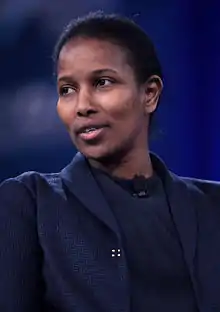
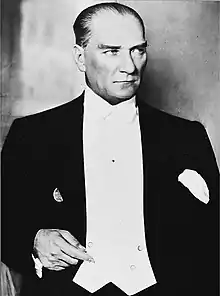
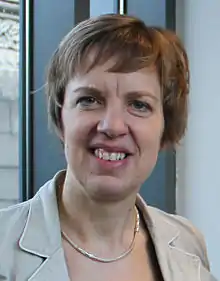
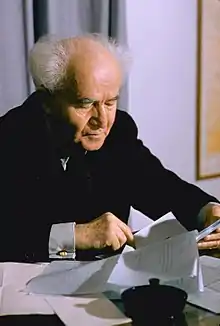
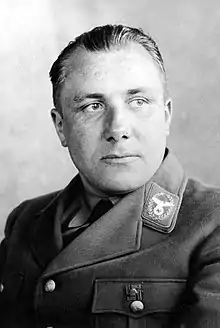
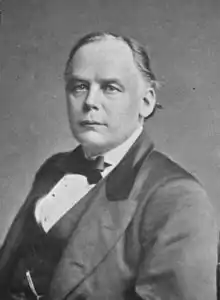
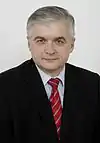
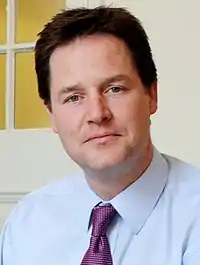
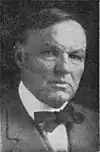
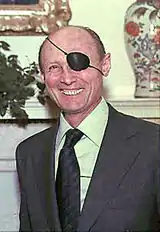
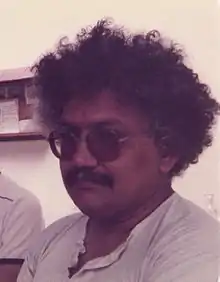
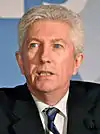
.jpg.webp)
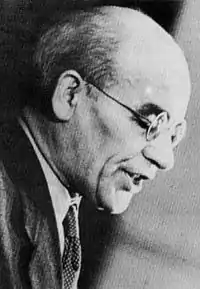
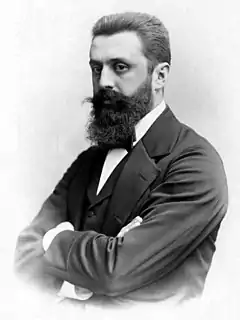
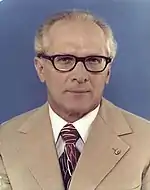
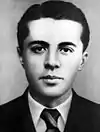
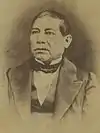
.jpg.webp)

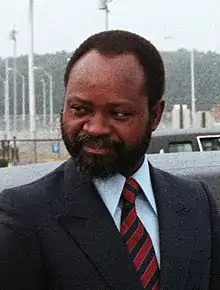
.jpg.webp)
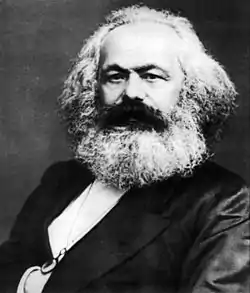
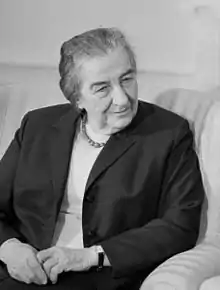
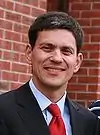

.jpg.webp)
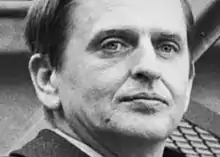
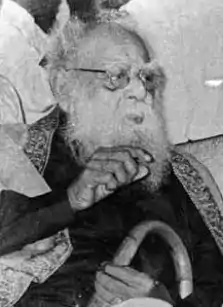
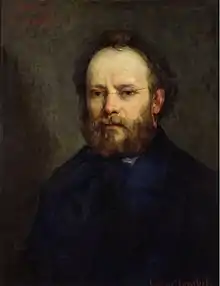
_cropped.jpg.webp)
